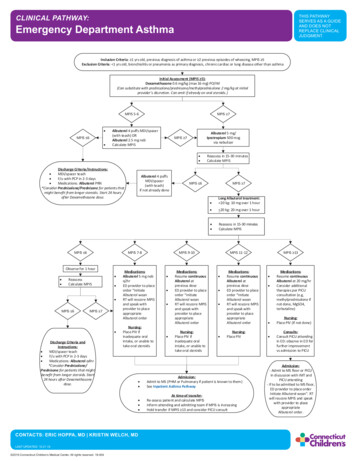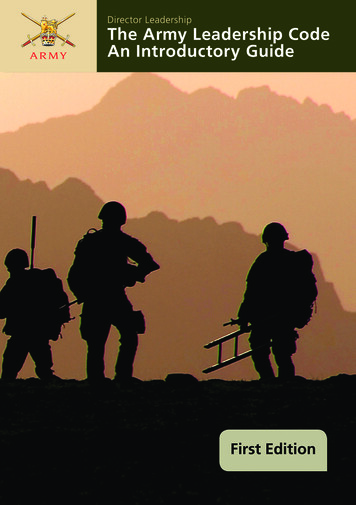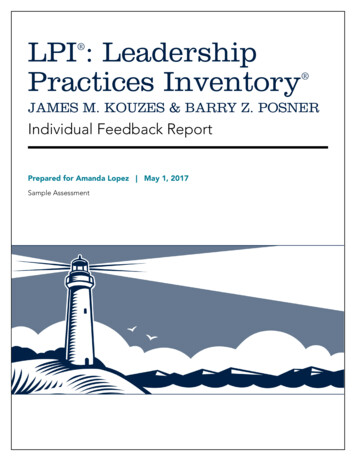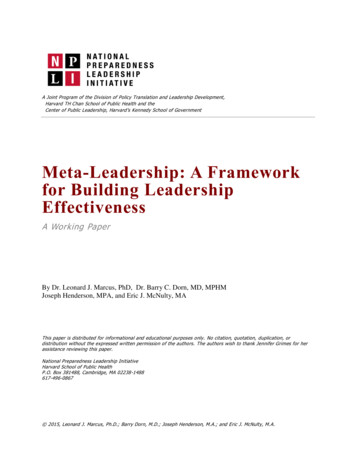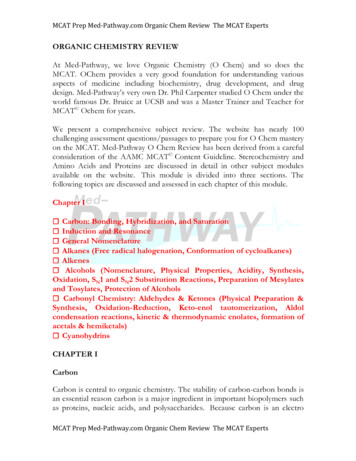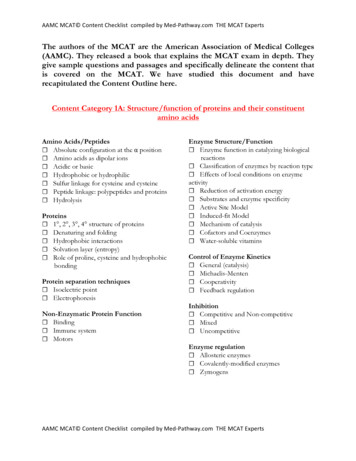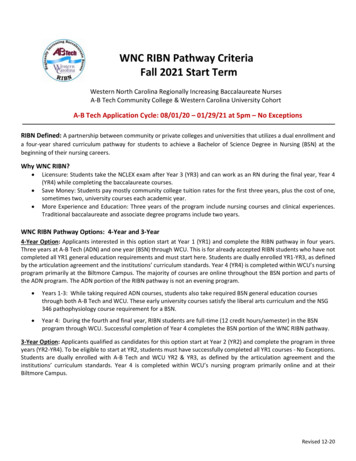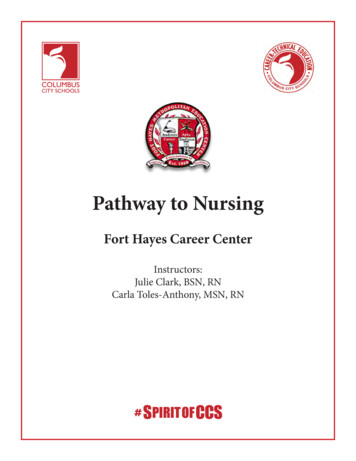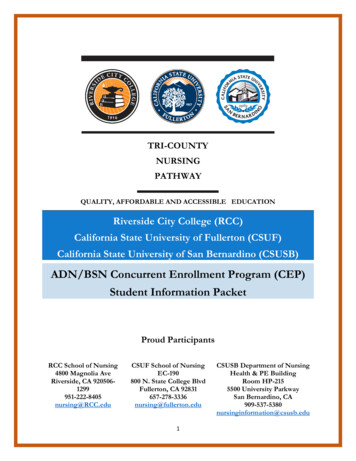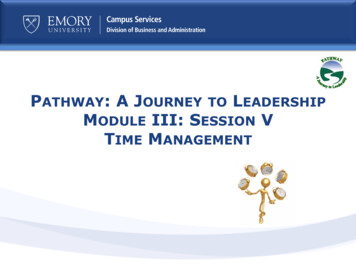
Transcription
PATHWAY: A JOURNEY TO LEADERSHIPMODULE III: SESSION VTIME MANAGEMENT
OBJECTIVES Understand the concept of time management andthe time management matrix Recognize how to prioritize effectively withmultiple responsibilities Manage and control chaos and interruptions Learn tips to reduce your stress levels andbalance work priorities Discuss The 7 Habits of Highly Effective People
TIME MANAGEMENT
WHAT IS TIME MANAGEMENT?Time Management is the act orprocess of planning and exercisingconscious control over the amountof time spent on specific activities,especially to increaseeffectiveness, efficiency orproductivity.
THE IMPORTANCE OF TIME MANAGEMENTIn time management you must recognize and utilize how workinghours are spent. There must be a prioritization of tasks in order tomaximize productivity in the workplace.Benefits of Time Management: Increases Productivity- prioritizing and setting realistic goals Motivation- time based deadlines Reduce Stress- make time for double checking Improve Work Quality– allowing allotted time for quality
TIME MANAGEMENT MATRIXUrgent vs. Important Urgent- A duty is urgent if you or others feel that it requiresimmediate attention Important- A duty is important if it contributes to your mission,values, and high priority goalsLet’s look at Stephen Covey’s Time Management MatrixTM
TIME MANAGEMENT MATRIXUrgentNot ImportantImportantI.CrisisPressing problemsDeadline-driven projects,meetings, preparationsIII.Interruptions, somephone callsSome mail, some reportsSome meetingsMany proximate,pressing mattersMany popular activitiesII.Not UrgentPreparationPreventionValues clarificationPlanningRelationship buildingEmpowermentIV.Trivial, busyworkSome phone callsTime wasters“Escape” activitiesIrrelevant mail/email
TIME MANAGEMENT MATRIXQuadrant 1Important/UrgentQUADRANT OF NECESSITY Represents things that are both “urgent” and “important” – weneed to spend time here This is where we manage, produce and bring our experience andjudgment to bear in responding to many needs and challenges Many important activities become urgent through procrastination,or because we don’t do enough prevention and planningKey action word: MANAGE
TIME MANAGEMENT MATRIXQuadrant 2Important/Not UrgentQUADRANT OF QUALITY & PERSONAL LEADERSHIP Includes activities that are “important, but not urgent” Here’s where we do our long-range planning, anticipate andprevent problems, develop others, broaden our minds andincrease our skills Ignoring this Quadrant feeds and enlarges Quadrant I, creatingstress, burnout, and deeper crises for the person consumed by itKey action word: FOCUS
TIME MANAGEMENT MATRIXQuadrant 3Urgent/Not ImportantQUADRANT OF DECEPTION Includes things that are “urgent, but not important” The noise of urgency creates the illusion of importance Actual activities, if they’re important at all, are important tosomeone else Many phone calls, meetings and drop-in visitors fall into thiscategoryKey action word: CAUTION
TIME MANAGEMENT MATRIXQuadrant 4Not Urgent/Not ImportantQUADRANT OF WASTE Reserved for activities that are “not urgent, not important” We often “escape” to Quadrant IV for survival (unimportanttelephone calls, emails) Making time for office gossip would qualify as Quadrant IV timewastersKey action word: AVOID
TIME MANAGEMENT MATRIXNot ImportantImportantIUrgentIINot UrgentList some ofyournecessitiesList some ofyour personaleffectivenessIIIIVList some ofyourdistractionsList some ofyour waste
GROUP ACTIVITYGroup Activity: Staying true in the moment of PersonalManagementSituation:You are about to have your weekly meeting with yourmanager, Shervon, and you are way behind for the day.You have 45 unopened emails and several messages onyour cell phone that you have not listened to. Janinecomes to you and asks, “Have you completed our projectthat you promised to finish today?” You haven’tcompleted it. Utilizing the Time Management Matrix, whatcan you do to better manage your schedule.Discuss with your group. Have one person in the group tell the classhow you would handle the situation.
TIME MANAGEMENT MATRIXTime Management Matrix Summary The best use of time focuses on importance (Quadrants I and II) Building relationships, planning and preparation are Quadrant II. Anticipate Quadrant I activities by spending time in Quadrant II You have to free up some of your time for Quadrant II Identify & eliminate unimportant matters in Quadrants III & IV thathave nothing to do with your job duties
MANAGING MULTIPLERESPONSIBILITIES
PRIORITIZING YOUR DAY
PRIORITIZING YOUR DAYManaging your time effectively will help you get more done each day.What can you do if you don’t have good organization skills?Here are seven techniques to help you prioritize your day and becomemore efficient:1. Plan your day- Each day go over a to-do list of important thingsyou must accomplish. Knowing what you must do will helpminimize conflicts and last minute rushes.2. Prioritize the task- This will ensure you spend time and energyon those responsibilities most important to you. Set goals for theday.
PRIORITIZE YOUR DAY3. Take the time you need to do a quality job- Doing workright the first time saves you time. If you make errors or rush, youare spending even more time on the corrections.4. Break large task into smaller tasks- Work on task inincrements until you get it all done.5. Delegate tasks- Know when to delegate tasks to employeeswho have the knowledge and skills necessary to complete it ontime.
PRIORITIZE YOUR DAY6. Learn to say no- Do not take on additional responsibilitieswithout completing your “must do” tasks. Consider your goals.7. Limit distractions- Minimize time wasters (gossip, non-workrelated phone calls and emails, interruptions). Avoid thetemptation of unnecessary socializing when you have to work.8. Prepare for the unexpected- Leaders have to find a way todeal with issues by implementing preventative plans, so scheduletime in your day to handle unexpected things.
MANAGING CHAOS ANDINTERRUPTIONS
MANAGING CHAOS
CHAOS AND INTERRUPTIONSYou can easily fall behind on your task by mismanagingyour time. If you do not recognize time wasters andprocrastination, you will lose sight of your duties goingunaccomplished.Time Wasters vs. Procrastination: Time Wasters- Things that interrupt you fromaccomplishing your job duties Procrastination- Putting off or delaying important jobdutiesBoth can cause chaos in your daily tasks. Manage chaosby organizing your day (free from time wasters andprocrastination)!
TIME WASTERSMost Common Time Wasters and How to Overcome Them Socializing on the job- say “I can’t talk right now. I’ll get back toyou.” Telephone interruptions- let non-job related calls go to voicemail.The telephone is a major time killer. Extended lunches or breaks- recognize when you’re wasting time. Drop in visitors- say “NO” when you don’t have time to talk. Poorly run meetings- decide what you need to do, can realisticallydo and move on. Not sticking to your RREs- make sure you are accomplishing yourgoals.
PROCRASTINATION VIDEO- WHENYOUR SUPPOSED TO BE WORKINGHTTPS://WWW.YOUTUBE.COM/WATCH?V IEHFSVASVMU
OVERCOMING PROCRASTINATION1. Ignoring the task, hoping it will go away- organize,schedule, and plan everyday2. Underestimating how long it will take- set and keepdeadlines3. Overestimating your abilities and resources- don’t beoverconfident in your abilities, ask for help if needed
OVERCOMING PROCRASTINATION4. Doing something else that isn’t very important- ask yourco-workers to help you stay on your priorities anddeadlines5. Talking about a hard job rather than doing it- divide a bigjob into smaller ones6. Telling yourself that poor performance is okay- make sureyour work is quality and reward yourself when you'redone
BALANCING WORK PRIORITIESRemember: Block out a specific time to accomplish your tasks Whenever you find yourself with some free time, do asmall part of your larger task Stay on top of things by being tough with your time Avoid periods of inactivity. There is always somethingyou can be doing, even if it is helping others
BALANCING WORK PRIORITIESIf you were to ask me what single practicewould do more to balance your life and increaseyour productivity than any other, it would bethis: plan your week each week before the weekbegins.-Stephen Covey
QUESTIONS/COMMENTSCS Training & Communications
THE 7 HABITS OF HIGHLY EFFECTIVEPEOPLE
HABIT 1:BE PROACTIVETHE HABIT OF PERSONAL RESPONSIBILITY
BE PROACTIVEThe Habit of Personal ResponsibilityUnderstand your paradigms- Paradigms are the way we see,understand, and interpret the world-our mental mapThe 7 habits moves through three stages: Dependence: the paradigm under which we are born, relyingupon others to take care of us. Independence: the paradigm under which we make ourdecisions and take care of ourselves. Interdependence: the paradigm under which we cooperateto achieve something that cannot be achievedindependently.
BE RIVATE1VICTORYBeproactiveDependence
BE PROACTIVEReactive vs Proactive Behavior Reactive Behavior- allows outside influences (moods, feelingsand circumstances) to control their responseExamples: get angry and say things you regret, whine and complain,blame other people, etc. Proactive Behavior- allows themselves the freedom to choosetheir response based on principles and desired results (takingresponsibility of every aspect of your life)Examples: Remain calm, think before acting, takes initiative to makethings happen, etc.
BE PROACTIVECircle of Influence Proactive Focus- When people focus on things they can influence, theyexpand their knowledge and experience while building trustworthiness.Their Circle of Influence grows. Reactive Focus- When people focus on things they cannot control, theyhave less time and energy to spend on things they can influence. TheirCircle of Influence shrinks.
BE PROACTIVEUse Proactive LanguageReactive Language I can’tIt’s not my faultI have toWe have no other choiceThey won’t let meThere’s nothing we can doProactive LanguageI canI’m sorryI choose toLet’s look at all of our optionsI will get this doneThere must be something we can do
BE PROACTIVEBecome a Transition Person A Transition Person breaks unhealthy, harmful, abusive orineffective learned behaviors and replaces them with proactive,helpful, effective behaviors. This person models positive behavior and passes on effectivehabits that strengthen and build others in positive ways.“To the world, you may be just one person; but to one person, youmay be the world.”-Josephine Billings
STEPHEN COVEY VIDEO- BE PROACTIVEHTTPS://WWW.YOUTUBE.COM/WATCH?V 8-SLG VGDO0
BEGINHABIT 2:WITH THE ENDINMINDTHE HABIT OF PERSONAL VISION
BEGIN WITH THE END IN MINDDefining your Vision and Purpose What is your Personal Mission Statement (a constitution bywhich you make all the decisions for you life)? What are you long term goals?. Have you documented your own vision in life? It can be difficult but it is necessary.Define your outcomes before you act!
BEGIN WITH THE END IN MINDDiscover Yourself I am at my best when: I am at my worse when: What to I really love to do at work? What do I really love to do in my personal time? My natural talents and gifts are:
BEGIN WITH THE END IN MINDPersonal Mission StatementHighly effective people shape there own future instead ofletting other people, their culture or their circumstancesdetermine it. A good mission statement: Is based on principles of effectiveness Clarifies what is most important to you Provides direction and purpose Represents the best in you
BEGIN WITH THE END IN MINDDraft Your Personal Mission Statement Take two minutes and write without stopping Start with a clear idea of what you want to achieve. Don’t worry what it looks like. Get your thoughts down onpaper. Over time, edit you statement until you have one that clearlydefines your vision and purpose in life.Share your statements with the class!
STEPHEN COVEY VIDEO- BEGINTHE END IN MINDWITHHTTPS://WWW.YOUTUBE.COM/WATCH?V TD3HQE HJUE
PUTHABIT 3:FIRST THINGS FIRSTTHE HABIT OF PERSONAL MANAGEMENT
TIME MANAGEMENT MATRIXUrgentNot ImportantImportantI.CrisisPressing problemsDeadline-driven projects,meetings, preparationsIII.Interruptions, somephone callsSome mail, some reportsSome meetingsMany proximate,pressing mattersMany popular activitiesII.Not UrgentPreparationPreventionValues clarificationPlanningRelationship buildingEmpowermentIV.Trivial, busyworkSome phone callsTime wasters“Escape” activitiesIrrelevant mail/email
PUT FIRST THINGS FIRSTYour Important Things Randomly list six important things you want to put firstin your work and personal life. Now prioritize them 1-6, with 1 being most important. Are you accomplishing these tasks effectively? Why orwhy not?
PUT FIRST THINGS FIRSTPrioritize your Goals A framework for prioritizing work that is aimed at short-termgoals Plan every week Delegation is an important part of time management Organize and execute around priorities Eliminate the unimportant
STEPHEN COVEY VIDEO- PUT FIRSTTHINGS FIRSTHTTPS://WWW.YOUTUBE.COM/WATCH?V CZQ6GZ4FOY
HABIT 4:THINK WIN-WINTHE HABIT OF MUTUAL BENEFIT
THINK WIN-WINSix Paradigms of Human Interaction WIN-LOSE: I win, you lose (I care only for myself and I would rathercompete than cooperate) LOSE-WIN: Everyone walks all over me (I am often intimidated andgive up easily) LOSE-LOSE: If I lose, so will you (I want you to lose even if it hurts me) WIN: As long as I win, I don’t care if you win or lose (I am self centeredand consider my needs only) WIN-WIN: Let’s find a solution that works for both of us (I cooperaterather that compete and seek mutual benefit)
Discuss The 7 Habits of Highly Effective People . TIME MANAGEMENT. WHAT IS TIME MANAGEMENT? Time Management is the act or process of planning and exercising conscious control over the amount of time spent on specific activities, especially to increase effectiveness, efficiency or productivity. THE IMPORTANCE OF TIME MANAGEMENT In time management you must recognize
